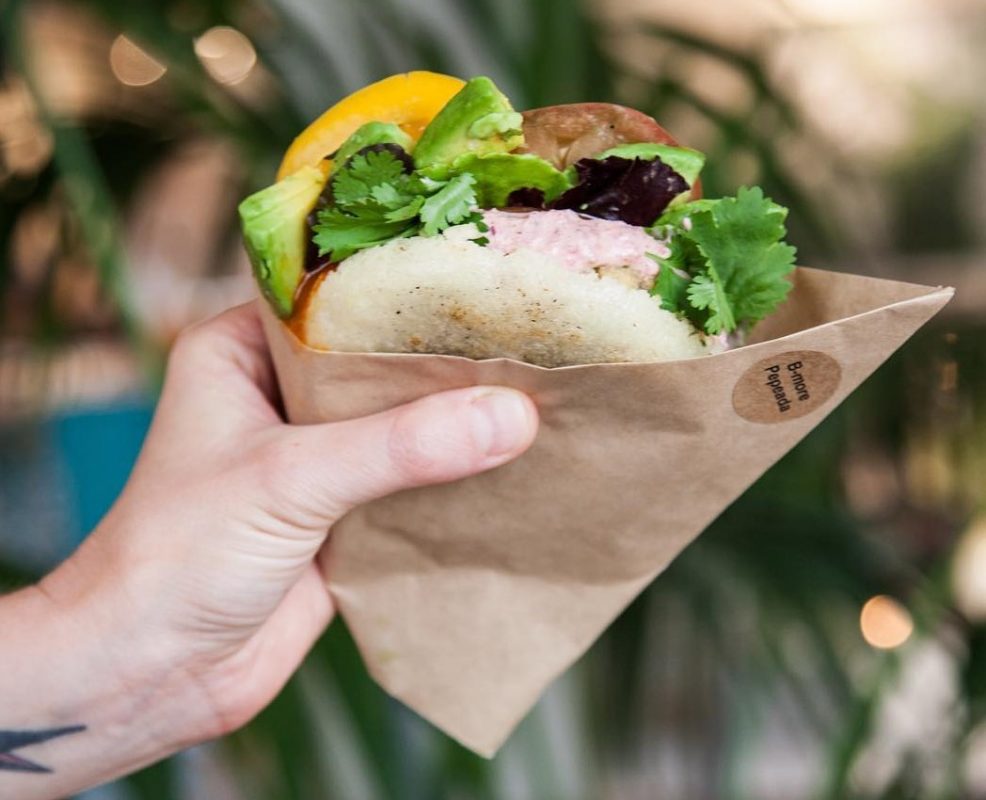
While Canton’s Alma Cocina Latina has transformed itself into a carryout arepa bar, husband-and-wife owners Mark Demshak and Irena Stein have also been focused on helping their back-of-the-house staff, most of whom don’t qualify for benefits, find employment. In addition to working at Alma, four of their staffers are also working in collaboration with Mera Kitchen Collective, a community-driven, food-based cooperative focused on empowerment for refugee and immigrant women.
Using the commercial kitchen at Neopol Smokery, Mera has been providing up to 700 free meals a day for Baltimore communities in need. “It’s one thing to sell food and feel the love and support that you get from of the community,” says Demshak. “What we’ve done with Mera Kitchen and the staff fills the heart.”
I know that several of your staffers have not been able to come into the kitchen to help with carryout. Can you talk about that?
IS: Our executive chef, Karem Barragan, is pregnant. She’s home—she places the orders for the kitchen. And then our sous chef, David Zamudio, who is Venezuelan is stuck in Spain. If we had an executive chef with us, we could do a lot more, but we can’t. Our back-of-the-house kitchen is extremely well-trained by our chefs, so they can run the whole thing beautifully, but we could have more ideas implemented if Karem and David were there.
“Mera Kitchen is now feeding thousands of people. In three weeks, they did 6,300 meals and four of our team players are there during the day.” —Irena Stein
How is your staff doing?
IS: Basically, we have three categories of employees: We have the people who have gone on unemployment, we have the people [with visas] with exceptional talent who cannot get unemployment, and then we have those who don’t have access to any of those benefits.
We are trying to avoid hunger among anyone. The situation here reminds me very much of the Venezuelan reality of no food, no toilet paper, no medical assistance. I never expected the U.S. to be on the same page as Venezuela, but this is so familiar for me.
This was a little easier for me to handle because I already know my priorities. Priority number one is that everyone has to be fed. The people who have the least possibility of income are the people whom we will support the most—those people on the hourly wages without access to services. Their children have to be fed. We employ them, rotating them in the kitchen with takeout and preparing the food, and then Mera Kitchen is now feeding thousands of people. In three weeks, they did 6,300 meals and four of our team players are there during the day. Between what we have going at Alma and what Mera offers them, they are fine. It’s a huge relief—that means they have food on the table.
Mera is based on a lot of Syrian and Eritrean food. Now, they have included our people. So you have Central American food, too. So these migrants are feeding the hungry in Baltimore, which I find fascinating. Our Mexican and Guatemalan guys have done Mexican food—they are all taking initiatives rotating the things that they do. And our chef who is stranded in Spain used to work on a cruise ship. He is giving them advice on how to cook for hundreds of people a day. You have all these nationalities serving this population in Cherry Hill.
“Mera is based on a lot of Syrian and Eritrean food. Now, they have included our people. So you have Central American food, too. So these migrants are feeding the hungry in Baltimore, which I find fascinating.”—Irena Stein
Did you have a relationship with Mera Kitchen Collective before this?
IS: We collaborated in the past doing Syrian and Venezualan food, which is perfect because we have a small Syrian community in Venuzuela. Two years ago, we did a collaboration “Damascus Meets Caracas.” [Co-founder] Emily [Lerman] and I became very close friends—we think alike in so many ways of supporting community. Alma and Mera Kitchen are just a natural combination. When this came along, I said to her, ‘If you ever have room for more people because your community is growing, we have these people who really need work.’ She said, ‘Absolutely,’ and now we have four guys from our kitchen working there every day.
MD: What’s interesting is that the people Emily was employing before were refugees. She was employing them to give them a livelihood—they weren’t necessarily trained chefs or line cooks. They didn’t necessarily have experience in catering, so what she found with our guys there is that it raised the level of the kitchen. Their payroll has been reduced significantly because they are moving faster, so she has more money to spend on food.
IS: Once this is over, she’s going to send her prospective team to Alma to train for a few months. To see these Latino guys working with the Syrian chefs and this other woman from Eritrea, you have these cultures that are completely different existing with no language—just sign language—and it creates understanding of other cultures and other mentalities. I love the humanity of it. All of these things have always mattered to us, but to have it in full display with this collaboration has been really wonderful. The guys are so appreciative of being able to work over there and every dollar becomes something important. As long as no one goes hungry, we have won.
“What we’ve done with Mera Kitchen and the staff fills the heart.” —Mark Demshak
How is your carryout going at Alma?
MD: Right now, we are functioning much more like an arepa bar you’d find in Caracas.
IS: The community has been lovely. I know we could be making more money if the chefs were around, but we do what we are doing the best we can. Some people are coming from 25 minutes away and we don’t want them to have a bad experience, so we are giving them instructions on heating the arepas. Some people will tell their building or their neighbors and they come on behalf of several families, which is so wonderful. We’ve also added cocktails and sangria.
Did you consider not doing carryout?
MD: We did consider not doing carryout for a split second. We thought let’s at least try it—we have things that you can carry out. If we didn’t have arepas, it would be much more difficult, because we don’t have our chefs here. Our line cooks are really extraordinary.
IS: It’s the legacy of [former executive chef] Enrique Limardo. Our executive chef and the chef had such a good experience learning under him.
“As long as no one goes hungry, we have won.” —Irena Stein
What will happen when Alma reopens for full service?
IS: We can’t answer clearly. We are concerned that it will be hard to have the restaurant be as full as it should be. [We don’t know what this will] mean to the city, the economy, and people going to restaurants. We have to see if we can do the menu the same way.
MD: We will continue to do take-out once we reopen. We’ve set it up in such a way that it’s a feasible business. At this point, it will be another revenue stream, so we will continue that.
